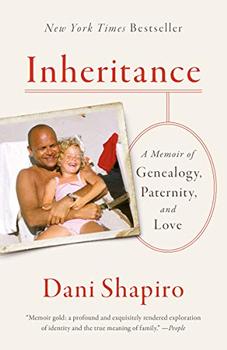Summary | Excerpt | Reading Guide | Reviews | Beyond the Book | Readalikes | Genres & Themes | Author Bio

A Memoir of Genealogy, Paternity, and Love
by Dani ShapiroChapter 23
Each time I felt strong and resolved enough, I typed various search terms into Google. Sperm donor. Donor conceived. Donor anonymity. Ethics of donor anonymity. History of sperm donation. I ordered all sorts of books, which would be waiting for me back home, packages stacked on our front porch. I already had a pile of articles from the 1940s through the early 1960s about Dr. Edmond Farris. I could hardly bring myself to read them. The language was archaic and devastating, like something from a science fiction comic book. Test tube tots. Was that what I once was?
There seemed to be communal outrage about donor insemination in the years surrounding my conception. Ethicists, religious scholars, lawyers, even many physicians believed it to be unlawful and immoral. At the same time, there was a smug certainty on the part of the doctors and scientists at the forefront of donor insemination. Secrecy, anonymity, and even eugenics were discussed in a matter-of-fact way. Donors were chosen for their perceived genetic superiority. Records, heavily coded, were sealed or destroyed. Parents were told to go home and forget it ever happened.
But the language of contemporary reproductive medicine was no easier to contemplate. As I scrolled through websites and online essays, words swam; sentences broke apart. In every other area of my life I was capable of clear thought. But here, I was back in the thick sludge. It became quickly apparent that the community of the donor-conceived was robust and active. I stumbled upon words I hated: apparently Ben Walden was my bio-dad. Paul Shapiro was my social dad. The phrases made me feel like a freak of science. But then I read that being donor-conceived often made people feel like freaks of science. One website offered special jewelry: Conceived just for you! Parent-on-a-chain necklaces fashioned out of aluminum, chrome, or brass, on which hung dog-tag–shaped charms customized with donor numbers. I wanted to hold myself apart, as if none of this really applied to me. The understanding that this world was my world, that I was donor-conceived, that this was indeed (and had always been) a term that applied to me, rose up like a concrete wall I slammed into again and again.
One name kept appearing on research papers, websites, even on Oprah: Wendy Kramer. She had created something called the Donor Sibling Registry, a resource for donor-conceived people who were out there desperately searching for their genetic relatives. I found myself wanting to reach out to Wendy Kramer' - but why? I didn't need her services. I had already found my biological father. Ben Walden didn't occupy the deepest, most tender part of my attention. What I wanted: confirmation from someone' - an expert' - that it was possible, no, more than possible, likely, no, more than likely, absolutely the case, that my parents had known nothing. The Farris Institute had hoodwinked them. Gone rogue. Someone must have decided it would be in this couple's best interest to add donor sperm to the mix without telling them. Maybe the institute was trying to increase its success rates. Or Dr. Edmond Farris had decided to play God.
Our last couple of days in Los Angeles were taken up with work meetings, more visits with Jacob, as well as lunches, coffee dates, drinks dates, and dinners with friends in that sprawling city that was, in many ways, a second home to us. Sometimes I told the story, and sometimes I didn't. I had begun to learn that telling it didn't necessarily make me feel better. Increasingly, I found that as I recited the narrative it became amorphous, the vastness of it like an echo chamber. I would feel my mouth move, hear the words as if someone else were speaking them. I grew quieter and quieter. I was dreading going home. I kept thinking of our house with its walls covered with portraits of my ancestors. My writing office, where I had surrounded myself with them: my grandmother, grandfather, my father and Aunt Shirley as children. I pictured a bucket of paint and wanted to whitewash the entire interior. A blank slate.
Excerpted from Inheritanceby Dani Shapiro. Copyright © 2019 by Dani Shapiro. All rights reserved. No part of this excerpt may be reproduced or reprinted without permission in writing from the publisher.
Your guide toexceptional books
BookBrowse seeks out and recommends the best in contemporary fiction and nonfiction—books that not only engage and entertain but also deepen our understanding of ourselves and the world around us.